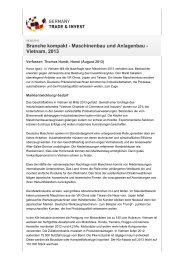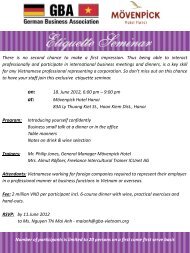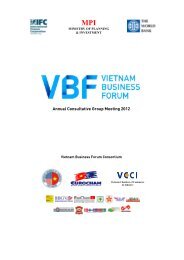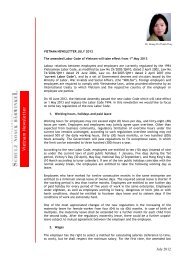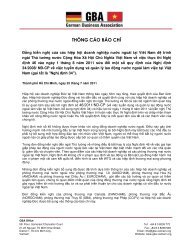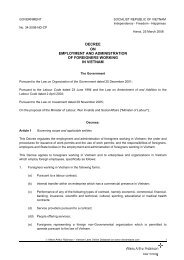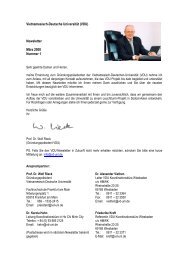Human Resources Working Paper on Labour Sub Leasing
Human Resources Working Paper on Labour Sub Leasing
Human Resources Working Paper on Labour Sub Leasing
You also want an ePaper? Increase the reach of your titles
YUMPU automatically turns print PDFs into web optimized ePapers that Google loves.
<str<strong>on</strong>g>Human</str<strong>on</strong>g> <str<strong>on</strong>g>Resources</str<strong>on</strong>g> <str<strong>on</strong>g>Working</str<strong>on</strong>g> <str<strong>on</strong>g>Paper</str<strong>on</strong>g> <strong>on</strong> <strong>Labour</strong> <strong>Sub</strong> <strong>Leasing</strong><br />
I. Introducti<strong>on</strong><br />
As Vietnam’s ec<strong>on</strong>omy is moving towards higher value-added and more technology and<br />
capital-intensive industries and service sectors over the next five years, Vietnam needs to<br />
adapt its workforce to be equipped. At the same time, at least 50% of all employment in<br />
Vietnam still is in the informal sector, with payment below minimum wages and no social<br />
and health insurances provided which is <strong>on</strong>e of the main causes of poverty in Vietnam.<br />
Within ASEAN, Vietnam ranks in the lower half of human resources development.<br />
Therefore, improving and upgrading the flexibility and skills of its workforce is <strong>on</strong>e of<br />
Vietnam’s key tasks to meet the needs of rapidly changing labor market at home and<br />
abroad. At the same time, moving people from the informal to the formal sector should be<br />
high <strong>on</strong> the agenda to secure social development in the next 10 – 15 years.<br />
EuroCham acknowledges that Vietnam has realized the urgency of improving its labor force<br />
and also needs to address several key issues in the ec<strong>on</strong>omy however we note that<br />
despite <strong>on</strong>going reform efforts, these reforms do not take in c<strong>on</strong>siderati<strong>on</strong> the rapidly<br />
changing face of the workforce, investor’s needs and keeping Vietnam’s competitiveness<br />
within the regi<strong>on</strong>.<br />
It is estimated that <strong>on</strong>ly 54% of employees currently working in Foreign Invested Enterprise<br />
are literature enough to be able to read and understand their labour c<strong>on</strong>tract. As well as it is<br />
estimated that more than 65% of Vietnam’s workforce is unskilled and more than 75% of<br />
20 – 24 years olds are either unskilled or skill-strapped, with over a milli<strong>on</strong> entering the<br />
work force each year.<br />
2. <strong>Labour</strong> “<strong>Sub</strong>-Lease”<br />
The draft <strong>Labour</strong> Code allows an enterprise licensed to sub lease shall have the right to<br />
sub lease employees to other enterprises under labour sub lease c<strong>on</strong>tracts between the<br />
two enterprises and according to the agreement by the employees.<br />
Recommendati<strong>on</strong>s:<br />
Eurocham supports the MOLISA to introduce <strong>Labour</strong> <strong>Sub</strong> Lease into Vietnam but would<br />
recommend that Vietnam takes internati<strong>on</strong>al practices terms as the definiti<strong>on</strong>s agreed by<br />
the HR services industry in Vietnam encompassing over 20 of the largest HR services<br />
providers in Vietnam, and completely open the market for temporary workers etc as below<br />
into Vietnam. Eurocham would be happy to lead this c<strong>on</strong>sultati<strong>on</strong> working with MOLISA <strong>on</strong><br />
this.<br />
Over the last 10 years there has been an increasing need to provide more flexible work<br />
force soluti<strong>on</strong>s to enterprises globally and private employment agencies have paid an<br />
important part in the soluti<strong>on</strong>s to these enterprises. As Vietnam has moved from an<br />
agricultural to manufacturing based ec<strong>on</strong>omy this need for a flexible workforce is more<br />
prevalent. These private employment agencies have been able to assist public<br />
employment services that struggle with the changing needs to enterprises and well as the<br />
labour workforce. Various organisati<strong>on</strong>s including the ILO under the No 181 in 1997<br />
recognised that private employment agencies can c<strong>on</strong>tribute to the functi<strong>on</strong>ing of the labour<br />
market and sets general parameters for the regulati<strong>on</strong>, placement and employment of<br />
workers by private employment agencies, in particular temporary workers.
We believe that the MOLISA should opt internati<strong>on</strong>ally recognised principles governing<br />
these private employment agencies namely the ILO C<strong>on</strong>venti<strong>on</strong> 181 1997 and<br />
internati<strong>on</strong>ally recognised CIETT Code of C<strong>on</strong>duct, which has over 70,000 members.<br />
Eurocham recommends opening the labour market for temporary work, c<strong>on</strong>tingency<br />
staffing, Outsourcing, C<strong>on</strong>tracting and Managed Business Services.<br />
By allowing these types of services in Vietnam, which worldwide employs 9.5 milli<strong>on</strong><br />
people, with over 700,000 jobs created through the use of temporary workforce this could<br />
employ 70% of the 18 – 24 years entering the work place market in Vietnam yearly. Also<br />
research shows the higher the temporary work penetrati<strong>on</strong> rate the lower the level of<br />
informal employment in the country. Also allowing the new workforce to gain in valuable<br />
work based experience thus improving the skills set in Vietnam can offer to new high value<br />
added investment projects, with Eurocham members requesting these services in Vietnam.<br />
These are the internati<strong>on</strong>ally recognised definiti<strong>on</strong>s of the industry as whole to be sure of<br />
the exact definiti<strong>on</strong>s and have a clear framework. Namely the definiti<strong>on</strong>s below agreed by<br />
the leading HR services providers in Vietnam, which also include several of the world s<br />
largest providers.<br />
Temporary workers (also called "c<strong>on</strong>tingency staffing" or "temps") are a work force<br />
that fills up the shortages of labour that arise due to business needs or staff shortage.<br />
While these workers may have full-time or part-time jobs with companies, they are paid by<br />
HR employment agencies which recruit and place these temporary staff. The companies<br />
using the temporary workers pay fees to these agencies. All statutory insurances and<br />
benefits are accrued and charged back to the client. The employment relati<strong>on</strong>ship that<br />
exists is between the “employees” and employment agency. Minimum durati<strong>on</strong>s normally<br />
apply that the temporary worker is made aware of and is guaranteed a minimum durati<strong>on</strong><br />
term.<br />
Outsourcing: This is the transfer of a business functi<strong>on</strong> to an external service provider.<br />
This is also called Business Process Outsourcing. The agreement is normally made <strong>on</strong><br />
Service Level Agreements <strong>on</strong> producti<strong>on</strong>, output, headcount, limitati<strong>on</strong>s and liabilities etc.<br />
Outsourcing involves an organizati<strong>on</strong> passing the provisi<strong>on</strong> of a service or the executi<strong>on</strong> of<br />
a task previously undertaken in-house to a third party to perform <strong>on</strong> its behalf. The client<br />
and the service provider have a service level agreement which clearly defines the<br />
employment related resp<strong>on</strong>sibilities of each party. The service provider carries the entire<br />
employment resp<strong>on</strong>sibility.<br />
C<strong>on</strong>tract Employees: C<strong>on</strong>tract employees are hired to perform specific functi<strong>on</strong>s in a<br />
c<strong>on</strong>tractual relati<strong>on</strong>ship and for a defined period of time. Day to Day management is by the<br />
client <strong>on</strong> site. C<strong>on</strong>tract employees can be hired through HR employment agencies<br />
Managed Business services: This is the practice of transferring day-to-day related<br />
management resp<strong>on</strong>sibility as a strategic method for improved effective and efficient<br />
operati<strong>on</strong>s. The pers<strong>on</strong> or organizati<strong>on</strong> that accepts and provides the managed service is<br />
regarded as the service provider. Typically, the client remains accountable for the<br />
functi<strong>on</strong>ality and performance of managed service and does not relinquish the overall<br />
management resp<strong>on</strong>sibility of the organizati<strong>on</strong> or system.<br />
We recommended working with the MOLISA to govern this and ensure full protecti<strong>on</strong> of the<br />
employees, with the following guidelines<br />
• Service Providers must be allowed to decide fair market value of salaries and services<br />
to be charged based <strong>on</strong> the complexities and nature of the service being offered to
Clients. To ensure competitiveness in the market and to be able to deliver these<br />
services providers should ensure all employees are protected under the <strong>Labour</strong> Code<br />
of Vietnam, but to pay fair wages. As this would mean there is flexibility or discreti<strong>on</strong>. It<br />
is up to the service provider to provide the service. Services Providers should have<br />
clear internal policies and grading <strong>on</strong> levels and promoti<strong>on</strong>s, roles etc <strong>on</strong> their internal<br />
collective labour agreements and policies, which should be made available to all<br />
employees.<br />
• Within all these agreements the Service provider holds the employment resp<strong>on</strong>sibility;<br />
• Employment relati<strong>on</strong>ship is the between the employee and the payee (Service<br />
Provider in this relati<strong>on</strong>ship).<br />
• Service Providers will not charge the employee any fees for introducti<strong>on</strong> of<br />
employment<br />
• Employee agrees to a labour relati<strong>on</strong>ship with the Service Provider that includes<br />
following the Customers work rules.<br />
• Customer and Service Provider agree commercial terms of service that include labour<br />
protecti<strong>on</strong> clause;<br />
• Clarificati<strong>on</strong> that the Customer holds required licenses to do business and that the<br />
service provider agrees to abide by the rules of these licenses (e.g.; mandatory staff<br />
safety training etc.);<br />
We believe by opening this market it will benefit Vietnam and its expanding workforce in the<br />
following ways:<br />
• Allow client to have a flexible workforce to adapt to producti<strong>on</strong> trends<br />
• Allow freedom to workers to decide when and where they work, enabling a stepping<br />
st<strong>on</strong>e for permanent employment.<br />
• Improving labour markets fluidity in an emerging market<br />
• Allows companies to seek additi<strong>on</strong>al support to attract workers<br />
• Mainly internati<strong>on</strong>al client outsource these functi<strong>on</strong>s to ensure that they can c<strong>on</strong>certed<br />
<strong>on</strong> their core functi<strong>on</strong>s, allow experts to manage these services for them<br />
At present Vietnam has a high unskilled and untrained workforce but allowing the above<br />
services the labour force will become more ready at an earlier age by having had work<br />
experience in the various methods as above. The services above create new jobs in the<br />
market and a more accessible workforce. These services providers can also assist in<br />
ensuring labourers rights are strictly adhered as many are servicing clients where this off<br />
an utmost importance. Private employment abstains from all illegal practices which ensure<br />
the safety and right of workers to move from <strong>on</strong>e agency to another.<br />
We suggest that these Private employment services work with the MOLISA <strong>on</strong> self<br />
governance and a code of c<strong>on</strong>duct to ensure:<br />
• Descripti<strong>on</strong> of Job, locati<strong>on</strong> of employment and details/ lengthen of c<strong>on</strong>tract<br />
• Wage payment and overtime<br />
• Other items under <strong>Labour</strong> Code should be compassed.<br />
• Minimum standards of professi<strong>on</strong>alism, with full disclosure to both clients and workers<br />
to exact nature of work and durati<strong>on</strong> whether hourly, daily, weekly or m<strong>on</strong>thly basis.<br />
• Resp<strong>on</strong>sibilities of all parties c<strong>on</strong>cerned



